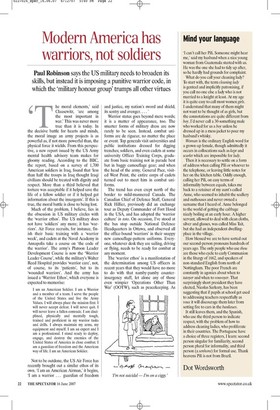Mind your language
'I can't call her Pili. Someone might hear me,' said my husband when a nice young woman from Guatemala started with us. He was the one she had to tidy up after, so he hardly had grounds for complaint. What do you call your cleaning lady? To start with, the term cleaning lady is genteel and implicitly patronising, if you call no one else a lady who is not married to a knight at least. At my age it is quite easy to call most women girls. I understand that many of them might not want to be thought of as girls, but the connotations are quite different from boy. I'd never call a 30-something male who worked for us a boy unless he dressed up in a mess jacket to pour my husband's whisky.
Woman is the ordinary English word for a grown-up female, though admittedly it occurs in collocations such as kept and scarlet which are impossible for lady. Then it is necessary to settle on a form of address when calling Pili or whoever to the telephone, or leaving little notes for her on the kitchen table. Oddly enough, calling her Pili, on easy terms of informality between equals, takes me back to a retainer of my aunt's called Anne, who seemed to inhabit the scullery and outhouses and never owned a surname that I heard of. Anne belonged to the world of getting the cabbage nicely boiling at an early hour. A higher servant, allowed to deal with clean cloths, silver and glasses, was called Miss Tait, but she had an independent dwellingplace in the village.
How blessed we are to have sorted out our second-person pronouns hundreds of years ago. The only people who use thou are those who cycle to early Communion in the liturgy of 1662, and speakers of non-standard English from north of Nottingham. The poor French are constantly in agonies about when to tutoyer and when to vouvoyer. That surprisingly short president they have elected, Nicolas Sarkozy, has been suggesting that if pupils at school get used to addressing teachers respectfully as vous it will discourage them later from setting fire to cars in the banlieues. It still leaves them, and the Spanish, who use the third person to indicate respect, with the problem of how to address cleaning ladies, who proliferate in their countries. The Portuguese have a choice of three registers, I learn: second person singular for familiarity, second person plural for informality, and third person (a senhora) for formal use. Thank heavens Pili is not from Brazil.
Dot Wordsworth




















































 Previous page
Previous page